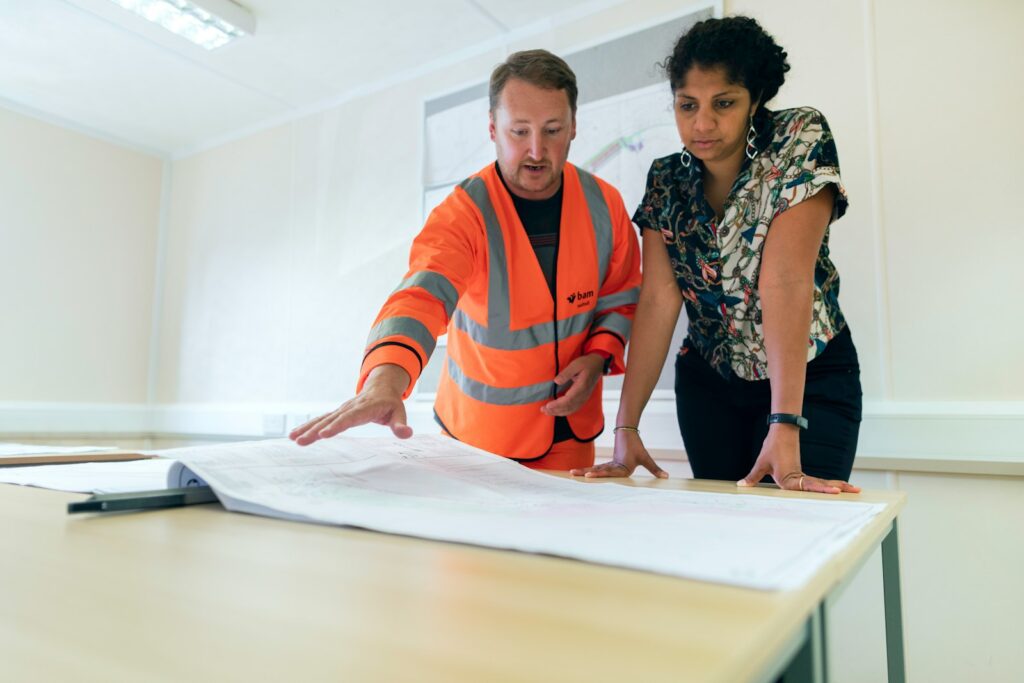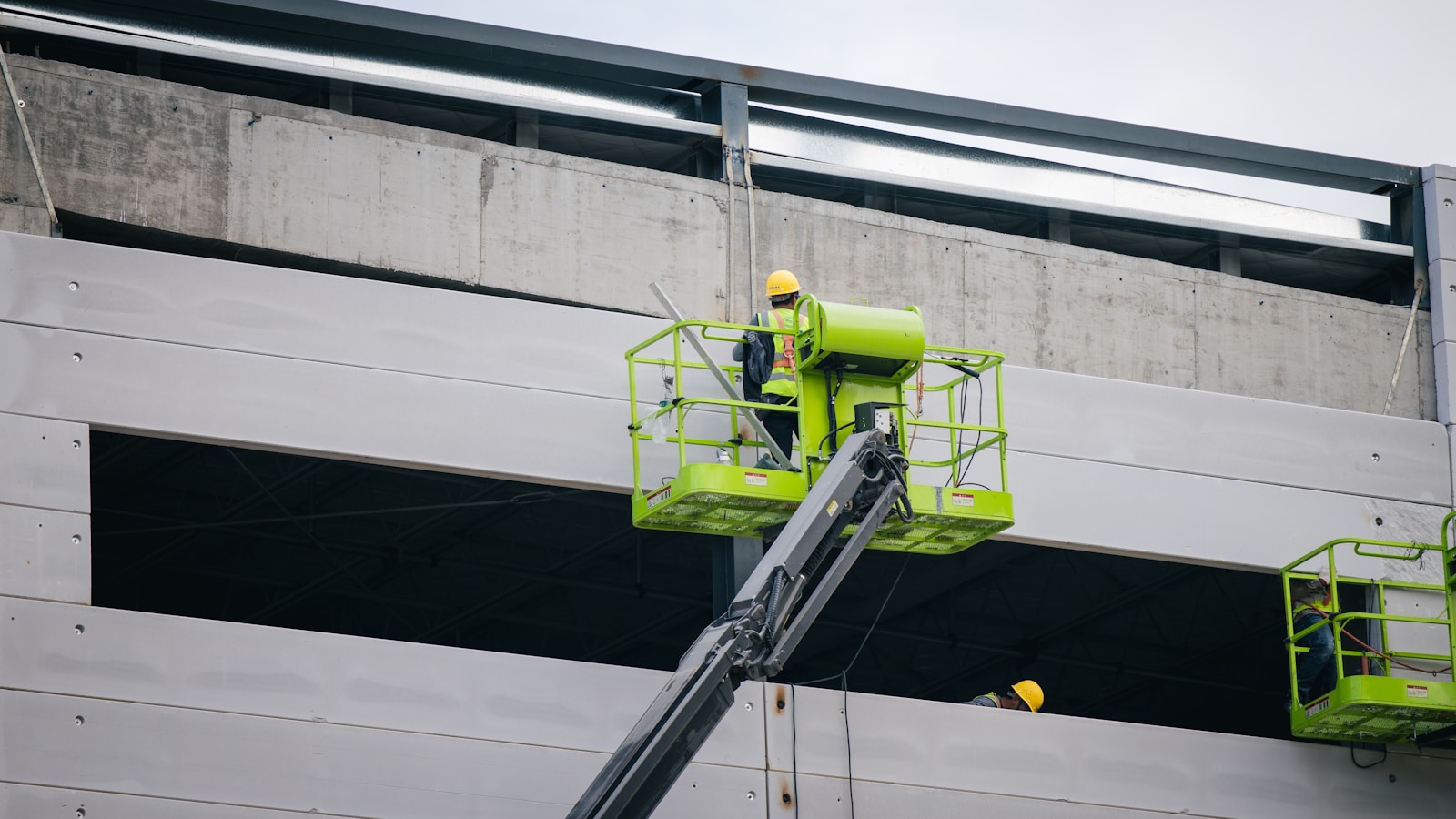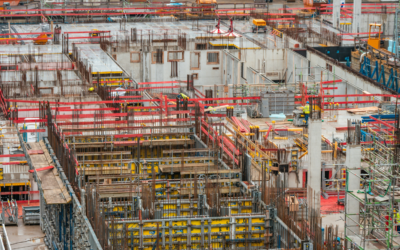Construction engineering stands as one of the most dynamic and rewarding fields within the engineering profession. This discipline combines technical expertise with hands-on problem-solving, offering professionals the opportunity to shape the built environment around us.
From towering skyscrapers to essential infrastructure projects, construction engineers play a vital role in transforming architectural visions into tangible realities.
At South Coast Improvement Company, we understand the intricate world of construction engineering from both sides—as employers of skilled construction engineers and as a company that has thrived on engineering excellence since 1990.
Our client-focused approach and award-winning design-build expertise provide us with unique insights into what makes construction engineering careers both challenging and fulfilling.
Whether you’re a student considering a construction engineering degree, a professional exploring career opportunities, or someone curious about the construction industry, this comprehensive guide will answer your key questions and provide valuable insights into this essential field.
It is especially useful for construction engineering students and engineering students seeking to enter the field.
What Do Construction Engineers Do?
Construction engineers serve as the backbone of any successful construction project, wearing multiple hats throughout the project lifecycle.
Their responsibilities extend far beyond simple oversight—they are problem-solvers, coordinators, and technical experts rolled into one, who solve problems and plan construction activities to ensure project success.
Project Management and Site Supervision
Construction engineers oversee construction projects from conception to completion. They coordinate with architects, subcontractors, and construction crews to ensure projects stay on schedule and within budget. This involves creating detailed project schedules, monitoring progress, and making real-time decisions to address unexpected challenges.
Their responsibilities extend far beyond simple oversight—they are problem-solvers, coordinators, and technical experts rolled into one. On site management is a critical aspect of their role, requiring their presence at the construction site to directly oversee activities and safeguard equipment.
At South Coast Improvement, our construction engineers have successfully managed projects ranging from the $18 million Atria Merrimack Place senior living facility to specialized healthcare facilities like Fresenius Kidney Care.
Their expertise in project management ensures that even complex projects are delivered efficiently and to the highest standards. They are also responsible for ensuring compliance with project plans, safety standards, and regulatory requirements during on site management.
Quality Control and Safety Management
Construction engineers are responsible for maintaining quality standards throughout the construction process.
They conduct regular inspections, ensure compliance with building codes and regulations, implement safety protocols to protect workers and future occupants, and review and coordinate project plans to ensure quality and safety standards are met.
Technical Problem-Solving
When unexpected issues arise on construction sites—and they inevitably do—construction engineers step in to develop innovative solutions, applying engineering design principles to address technical challenges.
This might involve redesigning structural elements, coordinating with environmental engineering specialists, or adapting construction methods to overcome site-specific challenges.
Client Communication and Coordination
Construction engineers serve as the primary liaison between clients and construction teams. They translate technical concepts into understandable terms for clients while ensuring that project specifications meet the client’s business needs and objectives.
Educational Requirements and Career Paths
Construction Engineering Degree Requirements
Most construction engineering positions require a bachelor’s degree in construction engineering, civil engineering, or a related field. A strong construction engineering program typically includes coursework in: courses designed to build foundational skills for construction engineering students.
- Structural analysis and design
- Construction methods and materials
- Project management principles
- Environmental engineering
- Mechanical engineering systems
- Computer-aided design (CAD)
- Construction estimating
- Building codes and regulations
Many universities offer specialized construction engineering programs that combine traditional engineering principles with construction-specific knowledge. These programs often include hands-on experience through internships and cooperative education opportunities.
For construction engineering students, completing internships, cooperative education, or undergraduate research projects is essential to enhance practical experience.
Professional Engineer License
Obtaining a professional engineer (PE) license is crucial for career advancement in construction engineering, as well as meeting the requirements for professional licensure in the field. The path to becoming a licensed professional engineer typically involves:
- Graduating from an Engineering Accreditation Commission (ABET) approved program
- Passing the Fundamentals of Engineering (FE) exam
- Gaining four years of relevant construction experience
- Passing the PE exam in your specialty area
Career Opportunities and Advancement
Construction engineering graduates can pursue various career paths within the construction industry:
Entry-Level Positions:
- Assistant project engineers
- Field engineers
- Construction inspectors
- Estimators
Mid-Level Opportunities:
- Project engineers
- Construction managers
- Site supervisors
- Quality control specialists
At this stage, developing people management abilities and the following skills: safety testing, data analysis, and project monitoring, which are essential for advancement, becomes increasingly important.
Senior-Level Roles:
- Senior project managers
- Construction directors
- Consulting engineers
- Business owners
The construction industry offers excellent opportunities for career progression. As your career progresses, you may specialize in specific areas such as commercial buildings, infrastructure projects, or sustainable construction methods.
Salary Expectations for Construction Engineers
Construction engineering offers competitive compensation that reflects the high level of responsibility and expertise required. Several factors influence salary levels, including geographic location, years of construction experience, and specialization area.
The average salary for construction engineers varies by region and experience, with national benchmarks available from sources like Salary.com.
Entry-Level Salaries
Recent construction engineering graduates can expect starting salaries ranging from $55,000 to $70,000 annually. Entry-level positions typically focus on learning construction operations, gaining hands-on experience, and developing essential skills under senior supervision.
Mid-Career Compensation
With 5-10 years of experience, construction engineers typically earn between $75,000 and $95,000 annually. At this level, professionals often hold project engineer positions and may supervise construction crews and coordinate with subcontractors.
Senior-Level Earnings
Experienced construction engineers with 15+ years in the field can command salaries exceeding $120,000 annually.
Senior project managers and construction directors at established companies like South Coast Improvement often earn significantly more, particularly when working on large-scale commercial projects.
What Is the Highest Salary for a Construction Engineer?
Construction engineers in leadership positions, such as construction directors or those who start their own firms, can earn $150,000 or more annually. Geographic location plays a significant role—construction engineers in major metropolitan areas typically earn higher salaries than those in smaller markets.
The value of construction experience cannot be overstated. Engineers who develop expertise in specialized areas such as sustainable construction, infrastructure projects, or complex mechanical systems often command premium salaries.
Is Construction Engineering a Good Job?
Construction engineering offers a unique combination of technical challenges, creative problem-solving, and tangible results that make it an attractive career choice for many professionals.
While a construction engineer is primarily involved in managing on-site construction and project execution, a civil engineer focuses more on the design, analysis, and planning aspects of infrastructure projects.
Civil engineers are primarily responsible for the design and planning of infrastructure projects, while construction engineers focus on on-site management and project execution.
Advantages of a Construction Engineering Career
- Job Security: The construction industry consistently needs skilled engineers, and infrastructure projects ensure ongoing demand for qualified professionals.
- Diverse Work Environment: Construction engineers work in offices, on construction sites, and in client meetings, providing variety that keeps the work engaging.
- Tangible Results: Few careers offer the satisfaction of seeing your work take physical form. Construction engineers can point to buildings, bridges, and infrastructure projects they helped create.
- Financial Rewards: As discussed earlier, construction engineering offers competitive compensation with excellent advancement opportunities.
- Problem-Solving Opportunities: Every project presents unique challenges that require creative solutions and technical expertise.
Challenges to Consider
- Physical Demands: Construction engineering involves regular site visits, which can be physically demanding and require work in various weather conditions.
- Project Pressure: Construction projects operate under tight deadlines and budget constraints, which can create stressful work environments.
- Regulatory Complexity: Keeping up with changing building codes, environmental regulations, and safety requirements requires continuous learning.
- Economic Sensitivity: The construction industry can be affected by economic downturns, though essential infrastructure projects provide some stability.
Is Construction Engineering a Hard Degree?
A construction engineering degree presents significant academic challenges, but these challenges prepare students for successful careers in the construction industry.
Engineering students develop the skills needed to succeed in demanding coursework.
Construction Engineering Program | Academic Rigor
Construction engineering programs require strong foundations in mathematics, physics, and engineering principles. Students must master complex concepts in structural analysis, materials science, and project management. Typically, this college-level work requires gaining a master’s degree.
The curriculum typically includes:
- Advanced mathematics (calculus, differential equations)
- Physics and engineering mechanics
- Materials science and testing
- Computer science and CAD applications
- Construction management principles
- Environmental engineering concepts
Practical Application of Construction & Civil Engineering
Many construction engineering programs emphasize hands-on learning through laboratory work, internships, and cooperative education experiences.
This practical component helps students understand how theoretical concepts apply to real-world construction projects.
Study Strategies for Success
- Develop Strong Math Skills: Success in construction engineering requires solid mathematical foundations. Students should focus on mastering calculus and statistics early in their programs.
- Gain Practical Experience: Internships and co-op programs provide valuable experience and help students understand how classroom concepts apply to actual construction projects.
- Build Communication Skills: Construction engineers must communicate effectively with diverse stakeholders, from construction crews to executive clients.
- Stay Current with Technology: The construction industry increasingly relies on advanced technologies like Building Information Modeling (BIM) and computer-aided design systems.
The Evolution of Construction Engineering
Construction engineering has evolved dramatically over the past several decades, driven by technological advances, environmental concerns, and changing client expectations.
Planning has become increasingly strategic and integrated with modern construction engineering practices.
Historical Context
Traditional construction methods relied heavily on manual labor and basic tools. Construction engineers primarily focused on structural integrity and basic project coordination.
Projects followed linear timelines with limited integration between design and construction phases.
Modern Construction Methods
Today’s construction engineering embraces advanced technologies and integrated project delivery methods. Modern construction engineers utilize:
- Building Information Modeling (BIM) for 3D project visualization
- Artificial intelligence for project optimization
- Sustainable construction materials and methods
- Advanced project management software
- Drone technology for site surveying and monitoring
Environmental Engineering Integration
Modern construction projects increasingly incorporate environmental engineering principles. Construction engineers must consider:
- Energy efficiency in building design
- Sustainable material selection
- Water management systems
- Waste reduction strategies
- Environmental impact assessment
At South Coast Improvement, we’ve adapted our practices to embrace these modern approaches while maintaining our commitment to client satisfaction and project excellence.

Photo by Danist Soh on Unsplash
The Construction Experience You Want | South Coast Improvement’s Design-Build Service Package
Our unique approach to construction engineering demonstrates how the industry has evolved to better serve clients’ needs.
South Coast Improvement’s Design-Build Service Package represents a modern approach to construction project delivery that eliminates traditional conflicts between design and construction phases.
The Single-Source Advantage
Traditional construction projects often involve separate contracts for design and construction, creating potential conflicts and communication gaps. Our design-build approach provides:
- Fixed absolute accountability for both design and construction
- Streamlined communication channels
- Integrated project delivery
- Reduced project timelines
- Enhanced cost control
Award-Winning Excellence
Our commitment to engineering excellence was recognized when we received the Bronze Award from the Design-Build Institute of America in 2022 for our work on The Residence at Great Woods LCB Senior Living project.
This recognition reflects our team’s technical expertise and client-focused approach.
Teamwork and Open Communication
As Lisa Cini from Mosaic Design Studios noted, “Contractors and designers aren’t always on the same page. But South Coast is such a team player. They’re collegial, flexible, and are more interested in the client’s end result than advancing their own agenda.”
This collaborative approach enables our construction engineers to work seamlessly with architects, designers, and clients to deliver superior results.
Why Choose South Coast Improvement?
Since 1990, South Coast Improvement has maintained a 90% repeat business rate—a testament to our commitment to client satisfaction and project excellence. Our success stems from several key factors:
Government agencies play a significant role in shaping construction engineering career opportunities and encouraging diversity in the field. Ohio University offers advanced online degrees in civil engineering, providing specialized coursework for those seeking to advance in construction engineering.
Geographic Expertise
With offices in Florida and Massachusetts, we bring broad experience and local knowledge to every project. Our construction engineers understand regional building codes, climate considerations, and market conditions that affect project success.
Comprehensive Service Delivery
Our construction engineers don’t just manage projects—they partner with clients to understand their business needs and deliver solutions that exceed expectations. Whether it’s a $1.5 million equity residential project or an $18 million senior living facility, we approach each project with the same commitment to excellence.
Proven Track Record
Our portfolio includes successful projects across various sectors:
- Senior living facilities (Atria Merrimack Place – $18 million)
- Healthcare facilities (Fresenius Kidney Care – $1.6 million)
- Residential projects (Equity Residential – $1.5 million)
- Affordable housing complexes (Gardner Terrace)
Client-Focused Approach
We understand that construction projects represent significant investments for our clients. Our construction engineers prioritize client communication, ensuring that projects align with business objectives and deliver measurable value.

Photo by ThisisEngineering on Unsplash
Building Your Future in Construction Engineering
Construction engineering offers an exciting career path for individuals who enjoy technical challenges, problem-solving, and seeing tangible results from their work. The field provides excellent compensation, job security, and opportunities for professional growth.
Whether you’re just starting your educational journey or considering a career change, construction engineering presents numerous opportunities for success. The combination of technical expertise, project management skills, and client interaction makes this field both challenging and rewarding.
The construction industry will continue to evolve, embracing new technologies and sustainable practices. Construction engineers who stay current with industry trends and continuously develop their skills will find themselves well-positioned for career advancement and professional success.
For those interested in experiencing the difference that client-focused construction engineering can make, South Coast Improvement Company stands ready to demonstrate how proper engineering expertise, combined with a commitment to excellence, can transform your construction vision into reality.
Ready to discuss your next construction project? Contact South Coast Improvement Company today to learn how our award-winning design-build approach and experienced construction engineers can deliver exceptional results for your organization.
Resources to Learn More About Construction Engineering
Construction engineering plays a critical role in bringing architectural designs to life through precise planning, technical expertise, and onsite execution. Whether you’re exploring it as a career or trying to better understand how it contributes to building projects, these resources offer valuable insights:
Introduction to Construction Engineering
- What Is Construction Engineering? – Indeed Career Guide
A beginner-friendly explanation of the field, job duties, and typical career paths. - Construction Engineering Overview – ScienceDirect
A more technical and academic overview covering key concepts and engineering challenges. - Construction Engineering and Management – MIT OpenCourseWare
Free course material from MIT exploring project planning, scheduling, and engineering roles.
Tools, Techniques & Real-World Application
- How Construction Engineers Shape Our World – ASCE (American Society of Civil Engineers)
Details the contributions of construction engineers in infrastructure and innovation. - Modern Construction Techniques and Technologies – ConstructConnect
Covers innovations in construction engineering, from robotics to BIM. - Engineering Project Management – ProjectManager.com
Learn how construction engineers manage budgets, timelines, and technical teams.
Careers & Certification
- Construction and Extraction Occupations – Bureau of Labor Statistics (BLS)
Career outlook, salary ranges, and job responsibilities (often overlaps with civil engineering). - Construction Engineering vs. Civil Engineering – Coursera
A breakdown of how the two fields differ and where they intersect.
View Our Work
Aspen Dental
Partnering with The Aspen Group on the construction of a new Aspen Dental facility that’s functional & welcoming for patients & staff alike. South Coast Improvement Company was awarded the construction of a new Aspen Dental facility in Killingly, CT. The...
Springhouse Senior Living – HumanGood
Designed to enhance comfort & functionality. South Coast Improvement company was hired by HumanGood for an interior and exterior renovation at Springhouse Senior Living. Our skilled teamtransformed the 2nd through 5th floor common areas into brighter, more...






